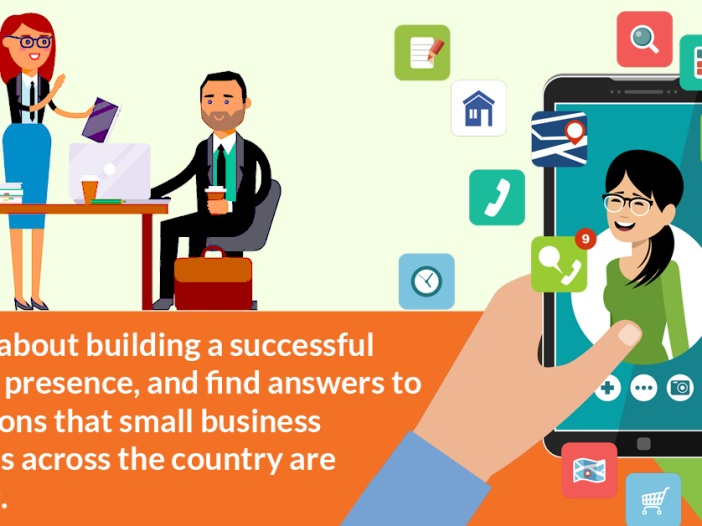
If you could ask an online expert about maximizing your small business’ online presence, what would you ask?
As the leader of a company that has more than three million small business customers, I’m approached time and time again for advice about how to set up a small business for success online — many times from those wondering if they even need an online presence in the first place.
From the day I started the company that would become Web.com, my passion has been helping small businesses succeed online, so I’m happy to address these questions every day.
We’ve captured small business owners’ most frequently-asked questions about building a successful online presence from audiences at our Small Business Summits, which take place in communities where PGA Tour and Web.com Tour events are held.
To find the answers to the questions that small business owners across the country are asking, take a look below!
Keep your website updated
Q: I have a website from the “Stone Ages,” do I REALLY need to update it?
A: Absolutely — if your website was built 10 or even just five years ago, you really need to update it.
In today’s web, content is king when it comes to helping your website establish credibility and relevance for search engines. If your content or code is dated, your website won’t show up. It’s that simple. Google continually refines the way it reads your website. You may have outdated software and you probably don’t have an analytics tracking capability to influence business decisions. Website style and “look” have also changed over the years, and an old website is not mobile optimized.
Today, over 30 percent of all web traffic is generated from a mobile device and it’s rapidly growing.
Still, there is one benefit with an older website — reputation of the domain name. This in itself increases credibility since a domain name that has been around for a long time is considered more creditable than a newer website. But, overall, the negatives of an old website greatly outweigh the positives.
One size doesn’t fit all
Q: What’s the most cost-effective solution that will bring the best business return for me? As a new business, where is the best place to start?
A: Well, it depends on your business goals and your target market. If your business is consumer-focused, social media channels — Facebook, Twitter, Pinterest, etc. — are most likely the best places to start to drive consumers to your website.
If your business is more product-focused, you need to build a good website that is optimized to sell.
If you’re trying to localize your business, a great website that is optimized in local arenas — Google Places, Yelp, local area directories — is a good place to start. But, no matter what your specific web needs are, it is always best to begin with a solid search engine optimization (SEO) effort, as SEO takes a long time to build. If you don’t begin with a smart SEO plan, your website will fall behind in credibility and organic search engine rankings.
SEO is very important
Q: What is the value of SEO? How do I know if my site is optimized? What does Google look at to rank a website?
A: Search engine optimization (SEO) is the primary tool with which Google reads your website to determine organic ranking in a user’s search.
To find out if your website is SEO optimized, you can simply search Google to see if your website comes up in the search listings. If it doesn’t, your website is most likely not SEO optimized. SEO is very valuable and is comprised of the technical aspects of your website, how it is built and how you describe the content of your site in the title tag and keywords.
On the other hand, it also looks at your website’s reach across the Internet — what are people saying about you on social media?
Is your business active on social media?
Is your website linked to your social channels?
Finally, Google looks at a website to find out if it is going to be relevant to searchers. Google examines the code of your website and the words written in the code. It starts at the top and goes down — looking at your title tag, page description — and it also reads images on your website to determine your website’s rank.
Making it worthwhile
Q: How do I make Facebook work for my business? How do I increase engagement on my Facebook page? Should I being doing Facebook, Twitter AND Pinterest?
A: Again, it all goes back to your business’ goals and target market.
Facebook will work if your target customers are already there; or if they’re on Twitter, focus your efforts on that platform. Social media is one of the best ways to increase engagement with prospects and existing customers. It’s also a vehicle to drive consumers to your website. Your website must be the nucleus of your online strategy — and it needs to make use of social media to help build its organic rankings.
Once you do so, everything should begin to come together.
You need to make sure your business and its website has a social focus, not just a business one. In regards to increasing engagement on your business’ Facebook page, you need to know your target market and its behaviors. One good note to remember: 70 percent of a Facebook post’s effectiveness disappears within five hours.
So, for example, if your core consumer isn’t engaging online at 9 a.m., you need to learn their Facebook habits and post your message when you know they are online. Also, make sure your updates always focus on a specific call-to-action — a coupon or a link back to your website.
And remember to keep your personal and business Facebook pages separate.
You need mobile
Q: Is having a mobile website important? How is the mobile version different from my main website?
A: Yes, having a mobile website is very important.
Nearly one-third of all searches are now conducted on mobile devices and 80 percent of mobile searches result in a purchase or other positive consumer action — so, you need to give your customers a seamless mobile experience.
Remember, consumers are looking for pertinent details about a business on-the-go — address, phone number, time of operation and directions; or they may want to quickly pay a bill or look up a product. A full website that is not mobile optimized will take too long to load and use.
Loading time must be quick as consumers do not have patience to wait – instead, they’ll move on to your competitor.
As I mentioned above, we gathered these real-life questions from audiences at our Small Business Summit events across the U.S. We invite local small business owners, free of charge, and there is no commitment involved; it’s simply a way for Web.com to give back to the local small business community.
Written by David L. Brown
Recommended Reading: 5 Things to Know Before Building a Website for Small Business
[wp_social_sharing social_options=’facebook,twitter,googleplus,linkedin,pinterest’ facebook_text=’Share on Facebook’ twitter_text=’Share on Twitter’ googleplus_text=’Share on Google+’ linkedin_text=’Share on Linkedin’ icon_order=’f,t,g,l’ show_icons=’0′ before_button_text=” text_position=’l’ social_image=”]
